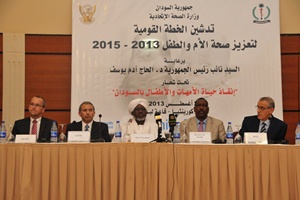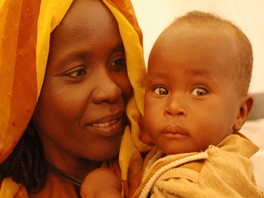The Sudan Household Health Survey 2010 reflected a 60% decrease in maternal mortality per 100 000 live births, from 537 in 1990 to 216 in 2010. Despite progress, child and maternal mortality remain high; at the current rate and without more intensive efforts, the country will be unable to achieve the targets of Millennium Development Goals (MDGs) 4 and 5.
The high-level gathering in Khartoum, led by the Vice President of the Republic of Sudan Dr Al-Haj Adam Youssef brought together officials from the Government, WHO, UNICEF, UNFPA, as well as the country’s diplomatic corps, highlighting their commitment to mobilize resources and work towards the implementation of the plan.
WHO Regional Director for the Eastern Mediterranean Dr Ala Alwan, together with UNFPA Regional Director for Arab States Mr Mohammed Abdel-Ahad, and UNICEF Country Representative joined hands with Sudan as it presented the plan that has been developed to accelerate the implementation of the most effective health interventions to improve the health of mothers and children. The plan aims to reduce maternal and under-5 child mortality in order to reach the targets of the MDGs.
The work plan was prepared after analyzing the current health indicators at locality level, and the process was technically supported by WHO, UNICEF and UNFPA. During preparation, the priority was given to localities with low coverage of maternal and child health services and community-based services (midwives and community health workers), and those with high population density.
The work plan will be implemented through several axes: expanding coverage of maternal and child health services to ensure equitable access for all population, strengthening the referral system at the primary health care level, raising community awareness regarding maternal and child health issues, strengthening and supporting the health system at the locality level and ensuring community empowerment to promote maternal and child health.
 Launch of the maternal and child health acceleration plan in Sudan Launch of the maternal and child health acceleration plan in Sudan |
 The Vice President of Sudan Dr Al-Haj Adam Youssef talks to Dr Ala Alwan, WHO Regional Director for the Eastern Mediterranean, about the launch of Sudan's maternal and child health acceleration plan The Vice President of Sudan Dr Al-Haj Adam Youssef talks to Dr Ala Alwan, WHO Regional Director for the Eastern Mediterranean, about the launch of Sudan's maternal and child health acceleration plan |









